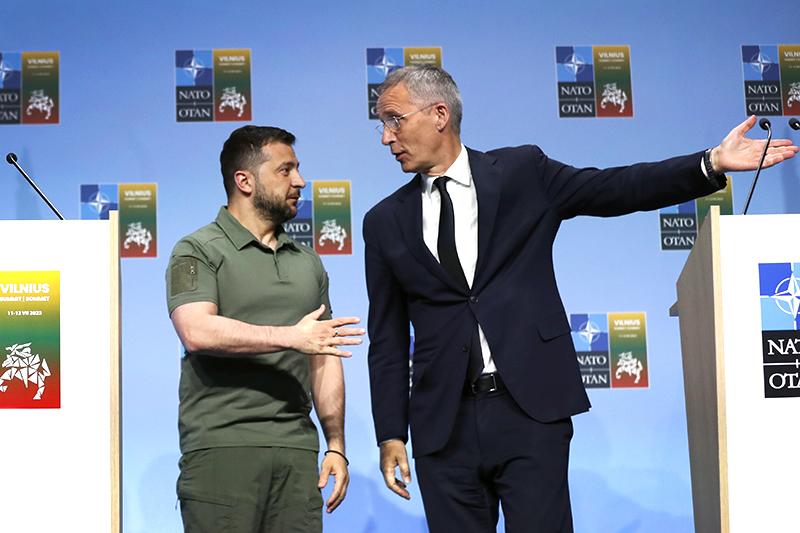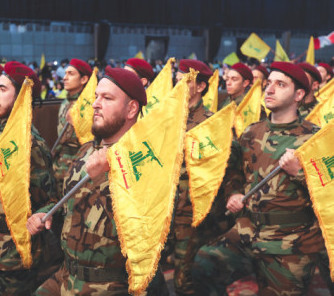
© Mindaugas Kulbis/AP/TASS
The Lithuanian capital city has hosted a NATO summit branded "pivotal" and "historic" by many Western analysts and journalists. The reason for such appreciation can be simply explained: it was supposed to consider the acutest issue of these latter days — Ukraine’s admission to the North Atlantic Alliance.
And yet, it was clear even before the meeting that bloc members weren’t ready or willing to take Ukraine aboard. At least, until Kiev defeats Russia on the battlefield, meets all the terms, and all the NATO give it the go-ahead. For this reason, the Vilnius summit failed to yield specific accession dates, with the United States and Germany suddenly opposing it most of all the others. A "consolation prize" to Kiev has become the Ukraine–NATO Council, a moronic thing which won’t give Kiev the hand when joining in. Besides, the NATO summit approved a multi-year military aid program for Kiev, while G7 adopted a declaration on further assistance and security guarantees.
Such a course of events has literally infuriated the Kiev regime, making President Vladimir Zelensky call NATO’s decision absurd. The US summit delegation was downright angry about this statement by the Ukrainian leader, if we follow a Washington Post piece. One of them also said Zelensky's social media announcement drove Washington up the wall. In turn, Politico notes that Western diplomats were also surprised and outraged by the words of the President of Ukraine addressed to NATO. The paper particularly quotes a senior European diplomat who believes Zelensky is "going too far."
Statements by various Western lawmakers and media indicate the world’s fatigue over Zelensky's demands, ultimatums and bossing around. Small wonder that journalists regularly refer to the phrase "the tail is wagging the dog." The only thing is that Zelensky can hardly be called "the tail" when it comes to the West as "the dog" – too good for the former comedian currently running a country. The West will never see him greater than a leader to confront Russia.
Ukraine's NATO membership did eventually become one of the key topics at the summit in Vilnius along with Turkey's consent to Sweden’s accession. However, these two issues have not reflected the summit’s kernel. The Alliance gathered in the Lithuanian capital at a time its military component is much more required than the political one. And this, we note, is for the first time not only since the end of the Cold War, but, perhaps, for the entire long-term history of the North Atlantic Treaty. NATO has been preparing for war with our country all the way through, no doubt about this.
However, the ongoing situation is completely different. The process of NATO's eastwards expansion launched some 30 years ago has brought the alliance to the verge of a direct clash with Russia. Moscow responded with a special military operation in Ukraine to the US and NATO defiance of its demands for long-term security guarantees put forward in December 2021. As a result, there has been a fierce armed confrontation with an unfixed number of participants, with Russia believing that NATO is explicitly siding with Ukraine in the conflict.
It is hardly surprising in this regard that the final summit communique refers to Russia as a major threat to NATO’s security. In particular, the document notes that "in the High North, its capability to disrupt Allied reinforcements and freedom of navigation across the North Atlantic is a strategic challenge to the Alliance." At the same time, it openly acknowledges that the existing set of tools to counter Russia is being enhanced.
The final communique emphasizes that NATO's strategic nuclear forces, primarily those of the United States, are the supreme alliance security guarantee. As stated in the document, the member states have come up with scaling up their critical ammunition stocks. Also, they expect to deploy an additional 300,000-strong force in Eastern Europe, creating more command-and-control points for missile defense systems, which requires at least an annual 2% of GDP on defense. Summit participants have agreed to maximize cooperation with the EU, including joint support, namely security guarantees, to Ukraine.
To counter the Russian "threat", NATO members have also approved a new Defense Production Action Plan designed to speed up the joint procurement process, increase production capacity, and step up interoperability among the allies — all of this being directed against our country. Decisions made at the summit in Vilnius have once again made it clear that the alliance is not going to combat Russia itself and will keep using the Armed Forces of Ukraine and foreign mercenaries as "cannon fodder". Moreover, the United States wants to pass the confrontation buck onto its European allies, particularly the Poles, the Finns and the Balts, while formally staying on the sidelines itself.
For Russia, little seems to have changed after the summit: a military defeat and political destruction of the Nazi Kiev regime are still a priority. However, in terms of tactics, it is necessary to consider the alliance’s growing activity in the West and Northwest, which needs to be preventively reversed to divert attention and resources from the Ukrainian track.
Apart from that, summit results quite obviously reflect NATO's desire to project influence beyond the North Atlantic. This may be evidenced by its intent to keep strengthening cooperation with partners in the Asia-Pacific (APR), such as Australia, New Zealand, South Korea and Japan, whose leaders were also present in Vilnius. Indeed, China is not exactly mad about this course of events, as it declaims against NATO expansion in the region as a threat to its own security. In this regard, Beijing said it would strongly retaliate against the bloc’s moves there, which should be taken seriously, because China is known to be always meaning what is says.









